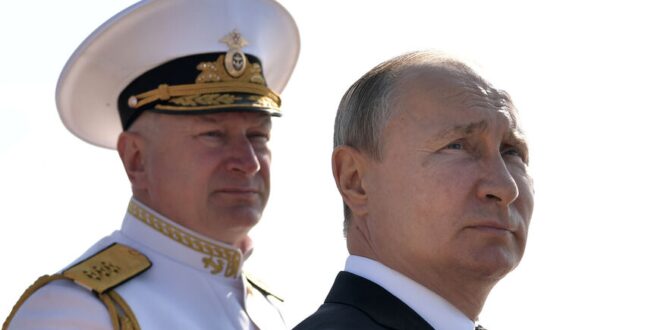Russian and Iranian commanders discussed forming joint committees tasked with deepening cooperation as sanctions-hit Tehran continues to lean on Moscow.
Russia’s navy commander Adm. Nikolai Yevmenov visited Tehran on Tuesday where he discussed boosting bilateral cooperation with his counterpart Shahram Irani,
The Iranian navy chief called for a joint committee to be set up for “further interaction in training and technical fields,” according to the state-run IRNA news agency.
“The enemy is pushing to disrupt the Iran-China-Russia triangle and block the trilateral cooperation,” Irani said, noting that the three countries have still managed to move forward together.
The meeting took place less than two months after Iran, Russia and China held four days of joint naval drills in the Gulf of Oman, where Iran’s Jamaran Moudge-class frigate rubbed shoulders with the South China Sea Fleet warship the Nanning and the Russian frigate Admiral Gorshkov.
During the meeting in Tehran, the two admirals reportedly pushed for new military agreements and their speedy implementation. The IRNA report did not produce further details but quoted the Russian navy commander as saying, “We are confident that we are on the right track.”
Since the Russian invasion of Ukraine, the Islamic Republic has been facing mounting accusations of assisting Moscow in the conflict, most controversially through shipments of drones that are reported to be targeting Ukrainian infrastructure on an almost daily basis. Iran has denied making such deliveries during the war, but has acknowledged military cooperation with its increasingly isolated ally.
Tehran’s push to forge a naval alliance with Russia also came at a moment of fresh criticism from its arch-enemy the United States over what is seen as the Islamic Republic’s destabilizing behavior in maritime routes.
Last week, the Pentagon announced plans to send reinforcements to the Persian Gulf, citing growing “harassment” by Iranian forces in the strategic waters.
The US National Security Council’s spokesperson John Kirby highlighted Iran’s record of having “harassed, attacked or interfered with” internationally flagged vessels.
Reacting, Iran’s Foreign Ministry dismissed the statements as “old and baseless accusations,” according to the semi-official ISNA news agency. Spokesperson Nasser Kanaani praised Iran as “the most efficient country in providing security of navigation in the Persian Gulf and international waters and has constantly guaranteed the safe transit of vessels through the Strait of Hormuz.”
In a span of less than a week between late April and early May, Iranian naval forces confirmed having seized two oil tankers: the Marshall Island-flagged Advantage Sweet and Panama-flagged Niovi. The two vessels remain in custody in unnamed Iranian ports.
 Eurasia Press & News
Eurasia Press & News



